Advances in Longitudinal Methods in the Social and Behavioral Sciences
Nonfiction, Reference & Language, Education & Teaching, Teaching, Statistics, Teaching Methods, Social & Cultural Studies, Social Science| Author: | ISBN: | 9781617358913 | |
| Publisher: | Information Age Publishing | Publication: | November 1, 2012 |
| Imprint: | Information Age Publishing | Language: | English |
| Author: | |
| ISBN: | 9781617358913 |
| Publisher: | Information Age Publishing |
| Publication: | November 1, 2012 |
| Imprint: | Information Age Publishing |
| Language: | English |
The importance that practitioners are placing on longitudinal designs and analyses signals a critical shift toward methods that enable a better understanding of developmental processes thought to underlie many human attributes and behaviors. A simple scan of one’s own applied literature reveals evidence of this trend through the increasing number of articles adopting longitudinal methods as their primary analytic tools. Advances in Longitudinal Methods in the Social and Behavioral Sciences is a resource intended for advanced graduate students, faculty, and applied researchers interested in longitudinal data analysis, especially in the social and behavioral sciences. The chapters are written by established methodological researchers from diverse research domains such as psychology, biostatistics, educational statistics, psychometrics, and family sciences. Each chapter exposes the reader to some of the latest methodological developments and perspectives in the analysis of longitudinal data, and is written in a didactic tone that makes the content accessible to the broader research community. This volume will be particularly appealing to researchers in domains including, but not limited to: human development, clinical psychology, educational psychology, school psychology, special education, epidemiology, family science, kinesiology, communication disorders, and education policy and administration. The book will also be attractive to members of several professional organizations such as the American Educational Research Association (AERA), the American Psychological Association (APA), the American Psychological Society (APS), the Society for Research on Adolescence (SRA), the Society of Research in Child Development (SRCD), Society for Research in Adult Development (SRAD), British Psychological Society (BPS), Canadian Psychological Association (CPA), and other related organizations.
The importance that practitioners are placing on longitudinal designs and analyses signals a critical shift toward methods that enable a better understanding of developmental processes thought to underlie many human attributes and behaviors. A simple scan of one’s own applied literature reveals evidence of this trend through the increasing number of articles adopting longitudinal methods as their primary analytic tools. Advances in Longitudinal Methods in the Social and Behavioral Sciences is a resource intended for advanced graduate students, faculty, and applied researchers interested in longitudinal data analysis, especially in the social and behavioral sciences. The chapters are written by established methodological researchers from diverse research domains such as psychology, biostatistics, educational statistics, psychometrics, and family sciences. Each chapter exposes the reader to some of the latest methodological developments and perspectives in the analysis of longitudinal data, and is written in a didactic tone that makes the content accessible to the broader research community. This volume will be particularly appealing to researchers in domains including, but not limited to: human development, clinical psychology, educational psychology, school psychology, special education, epidemiology, family science, kinesiology, communication disorders, and education policy and administration. The book will also be attractive to members of several professional organizations such as the American Educational Research Association (AERA), the American Psychological Association (APA), the American Psychological Society (APS), the Society for Research on Adolescence (SRA), the Society of Research in Child Development (SRCD), Society for Research in Adult Development (SRAD), British Psychological Society (BPS), Canadian Psychological Association (CPA), and other related organizations.















